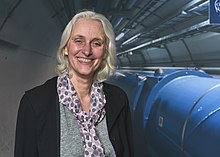Ursula Rita Bassler (born 1965) is a French-German particle physicist. Bassler was the President of the CERN Council from 2019 to 2021,[1] and deputy director of National Institute of Nuclear and Particle Physics (IN2P3), CNRS, from 2014 to 2015.
Ursula Rita Bassler | |
|---|---|
 | |
| Born | 1965 |
| Alma mater | Pierre and Marie Curie University (Ph.D. particle physics) |
| Scientific career | |
| Institutions | |
Early life and education
editBassler was born in Germany in 1965. She moved to France as an au-pair.[2] She completed her PhD in particle physics at the Pierre and Marie Curie University in 1993.[3]
Research and career
editShe joined the Nuclear and High Energy Laboratory (LPNHE), a joint research unit between the Centre national de la recherche scientifique (CNRS) and Pierre and Marie Curie University, where she worked on collider-based particle physics.[4] Bassler used data from the HERA particle accelerator, where she worked on the structure of the proton as a member of the H1 experiment at DESY in Germany.[3][5]
In 1998 Bassler joined the DØ experiment at Fermilab,[3][6] where her responsibility was to run the online calorimeter calibration.[7][8] She was part of a working group on structure function providing input to the Deep Inelastic Scattering Workshop in 1999.[9]
During the World Year of Physics in 2005, Bassler kept a blog at Quantum Diaries.[10] In 2006, she created the project Collisions, a multi-media project with Anaïs Prosaïc as director, which featured the physicists and engineers who work for the Large Hadron Collider. Bassler and Prosaïc made the documentary Collisions in 2008.[11]
In 2007 she was made Head of the Particle Physics division at the Institute of Research of the Fundamental Laws of the Universe at the French Alternative Energies and Atomic Energy Commission (CEA).[3][12]
She was scientific deputy director in particle physics and computing at IN2P3 (2014-2015), before becoming its deputy director (2016-2018).[4] At IN2P3, Bassler prepared the approval of the upgrades for the high-luminosity LHC (HL-LHC) detectors and the French participation in the European Open Science Cloud.[3]
She has been member of the DESY scientific council.[3]
In September 2018 Bassler was made the 23rd President of CERN Council. Her candidacy was proposed by France and Germany.[13]
As of August 2024, Bassler is affiliated with Laboratoire Leprince-Ringuet at École Polytechnique as CNRS researcher.
Bassler has published more than 500 peer reviewed papers[14] and she is editor of the popular science book Étonnants infinis.[15]
References
edit- ^ "Presidents and vice-Presidents of Council | CERN Council". council.web.cern.ch. Retrieved 2022-10-10.
- ^ "The Unifying Factor". www.helmholtz.de. 27 January 2020. Retrieved 2020-06-17.
- ^ a b c d e f "Ursula Bassler elected as next President of the CERN Council | CERN". home.cern. Retrieved 2018-10-08.
- ^ a b "Annuaire de l'IN2P3 - Ursula Bassler - Direction". annuaire.in2p3.fr. Archived from the original on 2018-10-09. Retrieved 2020-06-17.
- ^ Bassler, Ursula; Bernardi, Gregorio (1995-07-01). "On the kinematic reconstruction of deep inelastic scattering at HERA". Nuclear Instruments and Methods in Physics Research Section A: Accelerators, Spectrometers, Detectors and Associated Equipment. 361 (1–2): 197–208. arXiv:hep-ex/9412004. Bibcode:1995NIMPA.361..197B. doi:10.1016/0168-9002(95)00173-5. ISSN 0168-9002. S2CID 15794415.
- ^ Stone, Alan. "Photographs of D0 Collaborators". www-d0.fnal.gov. Retrieved 2018-10-08.
- ^ "DØ France Home Page". d0-france.in2p3.fr. Retrieved 2020-06-17.
- ^ "The D0-France group homepage". d0-france.in2p3.fr. Retrieved 2018-10-08.
- ^ "Deep import of deep inelastic scattering – CERN Courier". cerncourier.com. 1999-11-02. Retrieved 2018-10-08.
- ^ "Quantum diaries". Ursula Bassler : Year of physics. Retrieved 2018-10-08.
- ^ Bassler, Ursula (2008). "Collisions, LHC 2008". Videotheque CNRS. CNRS.
- ^ "Ursula Bassler : biographie, actualités et émissions France Culture". France Culture (in French). Retrieved 2018-10-08.
- ^ "DPB - September 28, 2018". franceintheus.org. Retrieved 2018-10-08.
- ^ "Publication list for U. Bassler". INSPIRE-HEP. Inspire. Retrieved 12 Nov 2019.
- ^ Bassler, Ursula, ed. (2022). Étonnants infinis (in French). Paris: CNRS éditions. ISBN 9782271143808.